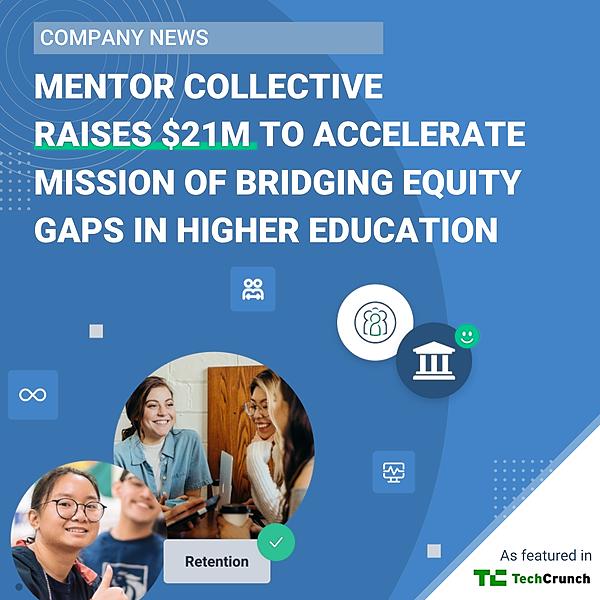Mentorship is a crucial ingredient to a student’s success. The demand for a platform to make the art of advice more accessible is thus easy for entrepreneurs to identify then pitch, but the serendipity — or the chasm between what makes someone an effective mentor versus just a speed dial for questions — is harder for them to scale.
Startups that want to scale mentorship across different industries need to build up a supply of mentors diverse, and present, enough to click with the variety of students in today’s society: ranging from the part-time graduate student who is busy with parent duties, to the burnt out, first-generation Ivy League star, to the engineer who just broke into tech but is struggling with work/life balance.
For Mentor Collective, a Boston-based startup founded in 2014, answers to the challenges and opportunities within scaled mentorship have taken time to figure out. The startup, founded by Jackson Boyar and James Lu Morrissey, began by pairing up students with mentors virtually, and over time has added more structure and management to its marketplace. It approaches the human questions of “how do you support intrinsic motivation” through participant surveys and algorithmic matching — while tackling diversity of student needs by building different curriculums for first-generation individuals, adult learners, veterans, BIPOC and others.
To date, Mentor Collective has 165 institutional, higher-education customers, including University of Colorado Denver, Penn State and Dartmouth. It also works with corporations such as Wells Fargo. On the supply side, Mentor Collective says it has trained more than 50,000 mentors since first launching.
While companies and competitors, including BetterUp and Sounding Board, have cumulatively raised hundreds of millions of dollars, Mentor Collective decided to bootstrap for the past seven years. CEO and co-founder Jackson Boyar believes the long game was necessary so they didn’t take too much money too early, like some other early-stage edtech companies he’s seen launch fast, and fail faster.

“Even though it took a really long time to get to where we are, we feel confident to spend this money and know it won’t negatively impact students,” Boyar said. “It did take us half a decade to figure this out, and if somebody thinks that it takes half a year, it’s a little audacious and not realistic…if your mission is about doing good, you probably need to adapt that mindset.”
Boyar announced today that his company has raised $21 million in a Series A round led by Resolve Growth Partners and continued investment from Lumina Foundation, an Indianapolis-based foundation focused on making lifelong learning more accessible.
Boyar initially started the company thinking that it would be a nonprofit. While that has since obviously changed, he thinks that starting a company by aggressively focusing on “product efficacy with the expectation that maybe it wouldn’t make that much money” helped build a key foundation.
“If you’re trying to convince a college dean or provost to buy something and you don’t have a randomized control trial that shows the impact on students, it’s kind of ridiculous that you’d ask me to spend $100,000 on your product,” he said.
The founder decided that it was time to take serious money when the company doubled in revenue last year, now nearing $10 million in annual recurring revenue. The more important milestone? Mentor Collective finally began offering more predictable outcomes for students, he claims.
According to an analysis conducted by Dr. Jenna Harmon, mentorship research lead and Dr. Joe Sutherland, head of data science, Mentor Collective helped power a 3.84% increase in student retention and a 14% increase in sense of belonging.
“These numbers might initially appear low, but even just 1% retention is significant in education…4% across a class of 5,000 students is 200 fewer students dropping out of school,” said Boyar. The magic metric for the company, as he just explained, is how it lowers drop-out rates for schools through giving students more subjective-based support. In money terms, if Mentor Collective can prove that a mentor increases a student’s likelihood of graduating, it could show that the university will gain more tuition revenue by using its service.
Another company, EdSights, has raised millions for a chatbot that connects students to resources or support services. “In a perfect world [where] we somehow had a magic wand that allowed us to collect the data on whatever we want on our fingers, what would we want to know to prevent [college] students from dropping out?,” co-founder Claudia Recchi said in a previous interview.
“Our form of mentoring is finding someone who does, or at least can, relate, and connecting them to you at the right moment in that journey, so that you can build a greater sense of belonging, that you’re more likely to graduate, that you get all the social mobility that college promises, but ultimately isn’t delivered to students who don’t look like the traditional college student,” Boyar said.
Currently, more than 50% of Mentor Collective’s mentor cohort is non-white, and 36% identify as first-generation college students. For now, the company is relying on volunteer mentors to support its mission, but now, with venture backing, could be under pressure to start paying the people it makes money off of. The COVID-19 pandemic helped the company secure 83,000 mentorships in 2021, double the year prior and up from 19,874 in 2019.
Looking back, Boyar thinks that his company could have been even more disciplined in focus during its earlier days. The demand for mentoring means that there are dozens of use cases for the platform, and the company often gets inbound from a variety of customers, from libraries to the military. While saying yes could work for short-term growth, the true efficacy of mentorship in those fields looks very different from person to person.
Now, with new incentives laid atop the company, Mentor Collective will need to make a series of choices on how to stay thoughtful and ambitious on the way it grows.




